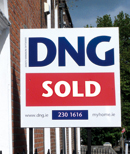
Houses in Dublin witnessed an annual price increase of 23% to the end of March 2014 as demand continues to exceed supply in the capital, according to the DNG Q1 2104 House Price Gauge.
According to the estate agency, the quarterly increase of 8.9% is over double the Q1 increase recorded in 2013 with properties in the entry-level house and apartment sector showing the biggest increase at 12.9%. The average resale of a Dublin house now stands at €329,719 reflecting an annual increase of €62,000 or €5,000 each month.
Lack of supply in the property market is continuing to drive prices with evidence of the increasing demand reflected in the 400,000 homes which are now rented versus 200,000 in 2006. Rising rents and the creation of an addition of 20,000 new households annually have all contributed to the increasing house inflation. Although residential property prices remain 50% below their peak, there has been a 36% increase on average since the market low point in early 2012.
Houses in the west of the city experienced the biggest annual increase at 30% while properties below €250,000 increased annually by 28% or 12.9% in the January to end of March period.
Commenting on the results Keith Lowe, CEO, DNG said: “Property prices in the capital were always likely to rebound quickly as they fell too fast and too far. What is happening at the moment is a realignment of house prices in the capital. This is good news for anybody who purchased a house in the greater Dublin area in the last 18 months and those in negative equity.
"We have also noted a marked improvement in consumer sentiment coupled with a significant increase in the availability of mortgage finance. We anticipate further market recovery this year in the capital and in a number of other key urban areas outside Dublin.”
According to DNG, in order to increase supply, the Government should follow the UK’s lead by introducing specific measures to support the battered housing building industry. Measures such as the introduction of a new homes grant or tax credit for buyers of new houses, supporting financial institutions in the provision of much needed construction finance, reducing financial contributions (and passing on the new 2014 reduced rates retrospectively to sites with existing planning permissions), exempting Social & Affordable Housing for borderline-viable schemes and reducing density guideline where required (this has been commenced by DCC in three areas of the city) is essential.
Full copy of the report is available on www.dng.ie





